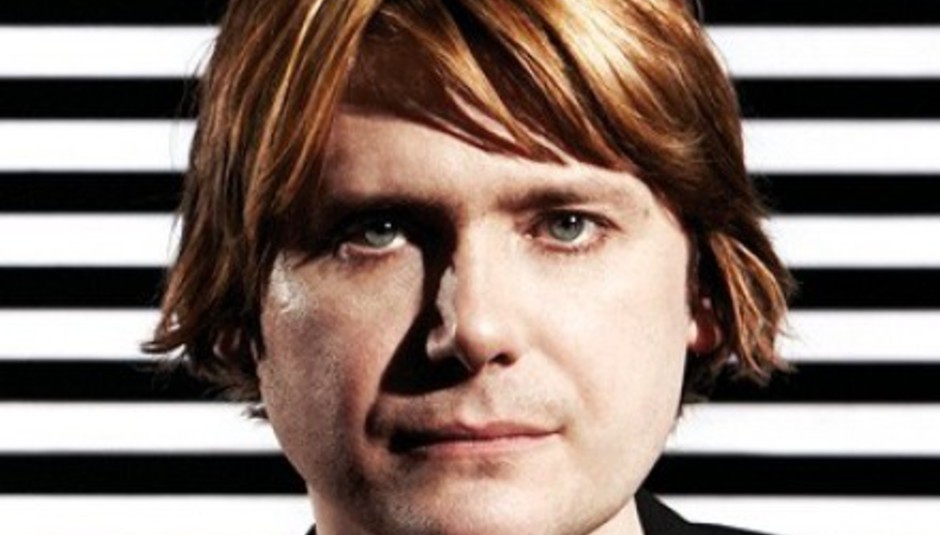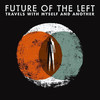In part two of our epic interview with the Manic Street Preachers' Nicky Wire, he talks about Richey, recording with Albini, and the writing process behind Journal for Plague Lovers.
BEHIND THE SCENES WITH THE MANICS: Nicky Wire on Richey, The Fans, The Lyrics
CAD: James [Dean Bradfield] mentioned that before recording the album he started listening to Simple Minds as a kind of talismanic gesture! Do you have any other strange rituals, before you record or write, or play shows?
NW: I always put my make-up on [laughs]. I used to do it in the hotel, and it became such a rush, and I’d get such odd looks coming out the hotel, but my ritual is that kind of calmness. That, and Champagne with two sugarlumps. James and Sean really don’t fucking say anything. They’re pretty miserable…!
CAD: What about when you were recording? Did you have any anxiety about recreating a similar feeling in terms of attempting The Holy Bible: part two?
NW: I think Steve Albini really made us feel up there. I mean that in a good way. We’ve never met him, and he didn’t really care about us. I really liked him and we loved working with him. But he’s not like “oh, make that song like ‘Design for Life’, or that song like ‘Faster’”. He doesn’t really know any of your work – he doesn’t care.
CAD: He sees himself very much as an engineer doesn’t he ? He doesn’t want to be called a producer...
NW: Yeah, he just records. And for that reason, it was difficult… but that’s like you said earlier, about those parameters – we wanted it to be like that. I think, because we were writing songs for a 27-year-old’s lyrics… that did give us an energy that has long since departed [laughs] a kind of crazed [energy]. You can hear it in ‘...Stephen Hawking’, with the gaps and the power and the rush… like I said to you earlier, you can’t force that. If we tried to force that, it’d be embarrassing, but somehow we lost some inhibitions, I think.
CAD: Do you feel you’re not the same band now that you were back then? As we discussed before, you’ve ended up somehow inadvertently educating a lot of your fans. Was that something that you were hugely conscious of at the time and is it something you still feel a certain responsibility for?
NW: It was to do with two books, really; England’s Dreaming by Jon Savage, and Lipstick Traces, by Greil Marcus [the latter lending its title to a Manics compilation]. Lipstick Traces; I re-read it every year, and there’s so much in it I don’t understand, but you probably know it better than me… It’s like an alternative encyclopaedia to culture. Even with some of it, when you think “That’s just a load of bollocks…” it doesn’t matter. That pretension and the knowledge can be a really good thing.
CAD: So, is it still an integral part of your manifesto, to introduce your fans to films and books?
NW: I get so much off them! Whether it’s clothes, whether it’s skirts and make-up.
CAD: I love your T-shirt… where d’you get that? [Nicky is sporting a lovely tshirt depicting a doll gagged and bound]
NW: It’s just something I bought …
CAD: She is ‘Gagged by Hollywood’!
NW: It’s a two-way enterprise now, as we grown older, and our fans have grown up with us, I do think we feed off each other. It is nice, sometimes, like on Send Away The Tigers… it’s a relief to be a big glamorous old fashioned rock band making a big fucking anthemic record… but it’s not a good thing to be like that all the time. people aren’t like that all the time, it’s not a good thing to be that intense all the time.
CAD: Even the most intense people have their sitting in front of the TV, in front of The Wire, days…
NW: Yeah… unfortunately Richey lost that ability to switch off. It’s one of the saddest things of all, when all of those things we’d talked about growing up, be it sport, be it films, be it books, he kind of… it’s gone, because his mind had accelerated to such a level that I just didn’t… I couldn’t keep up with him [becomes quieter, sadder]. I wanted to talk about the rugby, and he’d just lost all interest in it. Which I understood, I didn’t push it, but it was really sad –
CAD: It must have felt like losing a certain part of the person...
NW: It did… it did feel like that, yeah. You could tell he was aware of it, as well, he knew it. he was almost too full-on. He wasn’t annoying us or anything knew if it got boring. Like “it’s two o’clock in the morning! I don’t want to talk about Balzac!” You know…
CAD: Do you think it has something to do with an inability to engage in human relationships, in a way that the rest of the band were quite successful in doing? I guess you can only...
NW: You can only conjecture… there’s an element of that. It’s impossible to tell. When you read some of his writing, it certainly seems like he had problems with relationships. But in real life he did have lots of friends and people he liked. It's hard to tell...
CAD: There’s that comment you made, about him taking the piss out of you at Uni, when you broke up with a girl…
NW: He absolutely destroyed me! He wrote a big fucking sign up on the board, “You’ve been dumped!” [laughs]
CAD: Moving on to talk about the lyrics. I’m really interested in the process that the writing took. Obviously it’s a little different from when you were sharing lyrical duties or when you’ve been writing on your own.Were there any lyrics more than others that resisted being turned into songs, or were they the ones that you abandoned from the folder?
NW: It was a pretty natural process the actual folder. A lot of them were so short they were unusable. They were like haikus – they are like four lines. Some of them were just so impenetrable, I said to James, they just don’t work as music. Like I said, That’s just the way it’s always been. We didn’t feel bad about that… it’s not worth just putting a shit piece of music to a lyric. Do you know what I mean? Maybe someday we should print them all in a book; that might be a relief. Since it came out, it’s felt like a much more heavy burden releasing it than making it.
CAD: Do you think the fact that both you and James had made solo records in the interim period, did that give you a different “window” on taking these lyrics?
NW: It did for me. Well, I wrote ‘William’s Last Words’, and ‘Marlon JD’, and the verse of ‘She Bathed Herself [in Bleach]’, and the chorus of ‘Peeled Apples’. For me, that was quite a prolific musical contribution…! And definitely, the fact that I learned the acoustic guitar again, for the solo stuff, made me feel like I could be a really pale imitation of George Harrison, and come up with one or two classics per album… I think that would just be a perfect scenario!
CAD: Watch this space...!
NW: I guess the starter was ‘Your Love Alone...’ because I wrote half the music for that. I never let James forget that either.
CAD: Does he feel like you’re intruding on his turf a bit? Does he get territorial – "stay off my patch"!
NW: Nah, I think he really likes it, until I start winding him up! "Those three chords. 'Your Love Alone...' - they saved our career!"...
CAD: I guess again it’s that’s a fresh perspective. You’ve been doing the same role for so long…
NW: Yes, but the more I look back on the band. If you strip everything away, even the songs away - it’s just a pretty bizarre and remarkable story, isn’t it?
CAD: In another interview, you said “Richey wasn’t looking for an Ivor Novello [Award], he wanted a Pulitzer Prize.” Did you see that as your job then – turning literature into lyrics? Or do you disregard this High Art / Low Art dichotomy?
NW: I also said in that interview, I love the idea of Richey’s ambition. It goes back to ‘Faster’ – “I am stronger than Mensa, Miller and Mailer...” – the insane ambition of his intellect. That’s what I meant about the Pulitzer Prize. He was taking lyric writing really seriously, he reached the apex of creativity with this record. For me, After this, he would have started writing novels, would have been the logical conclusion. He could still have written lyrics, still been in the band but he would definitely have started writing… serious fiction
CAD: But yet the lyrics seem so fully formed as lyrics (bridge, chorus etc.)…?
NW: Yes. We loved writing lyrics we loved being in the band. But the artform of the lyric was to be elevated to something much more than people perceived it as… just like Morrissey did when we’re growing up. That’s where we are now…that’s kind of gone no-one else seems to care as much about the words as we do.
CAD: You‘ve always placed these excerpts of film dialogue in between the songs. I’m really interested in how you perceive the relationship between film and the lyrics, why did you use The Machinist for 'Peeled Apples'? [the opening sample is Christian Bale’s character, saying “You know so little about me. I might turn into a werewolf or something…”]
NW: well, obviously, Richey never saw The Machinist, but with the things on there, we thought either he did like it, or he would have liked it. The Virgin Suicides… in ‘Doors Closing Slowly’. He never saw the film but he loved the book so it seemed to fit. With The Machinist… he would have liked the film… I think he would have loved Christian Bale. He’s the only person who could play Richey in a film
CAD: Oooh - any plans for a film?!!
NW: No… but I think [Christian Bale] would do it justice. His ability to morph into things.
CAD: Did you see the Anton Corbijn film, Control? What did you think of that?
NW: I had conflicted feelings. I think he did a good job, but Manchester didn’t look like that in the 70s…
CAD: Like an Athena poster…
NW: In terms of the personal side of [the film] it’s hard to criticize it. But the film on us would undoubtedly be fucking awful – loads of Welsh people in it going [adopts hilariously exaggerated Welsh accent] “But Ian lad…!”
CAD: You could get Rhys Ifans in there…
NW: Oh No… But The Machinist, that seemed to fit. The insomnia – Richey was suffering from insomnia, too. It seemed to fit – that little bit of menace. But it’s the implication of [attempts a Christian Bale impersonation] “If you were expecting another Send Away the Tigers, then, this is a different kind of beast”
CAD: Oh! I see… like the beginning of that Panic At The Disco album… a kind of prologue.
NW: It did seem like the beast had changed it’s clothes on this record: It’s like a little warning.
Click here for Part Three.
If you missed it, read Part One of the interview here
The Journal for Plague Lovers remix EP is out now, featuring reinterpretations by The Horrors, Adem, Errors, British Sea Power and Andrew Weatherall.






















